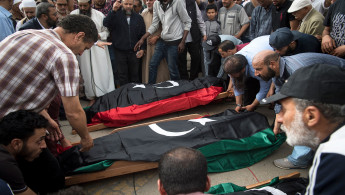UN: 443 killed in Libyan capital since last month as a result of Haftar offensive
The UN’s health agency, the World Health Organization, says 443 people have died and 2,110 have been wounded in violence in Libya's capital since the head of the self-styled Libyan National Army, rogue General Khalifa Haftar, launched an offensive against Tripoli last month.
With the number of people displaced by fighting approaching 60,000, the World Health Organization said in a tweet Wednesday that it is working to coordinate ongoing health services for them.
Twitter Post
|
U.N. spokesman Stephane Dujarric said Wednesday the U.N. is very concerned about reports that airstrikes a day earlier hit a migrant detention center in Tajoura in eastern Tripoli, reportedly injuring two migrants.
He told reporters the U.N. mission in Libya "is also deeply concerned about increased cases of arbitrary arrest and abduction of officials, activists and journalists" and is calling for their immediate release.
On Monday the UN called for a one-week ceasefire in Tripoli, but this call was ignored by Haftar, who urged his troops to "wipe out" forces loyal to the internationally recognized government of Prime Minister Fayez Sarraj during the Islamic holy month of Ramadan. Prime Minister Sarraj is currently on a tour of Europe to gain political support for his beleaguered government against Haftar.
Tripoli was relatively calm on Wednesday following fierce fighting the night before. Mohammed Qununu, he official spokesman for the government’s “Volcano of Anger” Operation, which is defending the capital against Haftar’s offensive, told the New Arab that government forces had stopped an attempt by Haftar’s forces to advance in the south of the capital on Tuesday evening and sporadic clashes were continuing on one front.
Read more: Has Haftar killed the political process in Libya?





 Follow the Middle East's top stories in English at The New Arab on Google News
Follow the Middle East's top stories in English at The New Arab on Google News
![The UAE is widely suspected of arming the RSF militia [Getty]](/sites/default/files/styles/image_330x185/public/2024-11/GettyImages-472529908.jpg?h=69f2b9d0&itok=Yauw3YTG)
![Netanyahu furiously denounced the ICC [Getty]](/sites/default/files/styles/image_330x185/public/2024-11/GettyImages-2169352575.jpg?h=199d8c1f&itok=-vRiruf5)
![Both Hamas and the Palestinian Authority welcomed the ICC arrest warrants [Getty]](/sites/default/files/styles/image_330x185/public/2024-11/GettyImages-2178351173.jpg?h=199d8c1f&itok=TV858iVg)